#acts of the apostles
Explore tagged Tumblr posts
Text
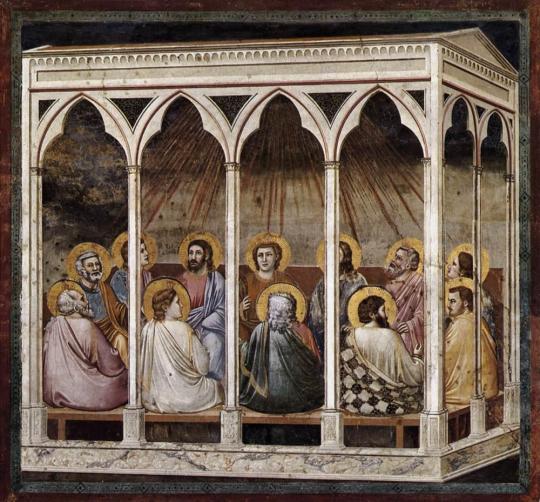
Scenes from the Life of Christ: 23. Pentecost, Giotto, between 1304 and 1306 (fresco in the Scrovegni Chapel, Padua)
#Pentecost#liturgical year#liturgical calendar#art#art history#Giotto#Giotto di Bondone#Middle Ages#medieval#medieval art#religious art#Biblical art#Christian art#Christianity#Catholicism#Book of Acts#Acts of the Apostles#Gothic art#International Gothic#Italian Gothic#Trecento#Italian art#14th century art#fresco#Scrovegni Chapel
844 notes
·
View notes
Text
Utterances of Christ on the cross in the gospel of Luke | Statements of Stephen the Martyr in Acts (also by Luke)
Christ:

Stephen:

Christ:

Stephen:

Christ:

Stephen:

60 notes
·
View notes
Text

16 notes
·
View notes
Text
You can't be a nobody AND believe in Jesus at the same time, it's impossible.
Acts of the Apostles 1:7-8 NLT
[7] He replied, “The Father alone has the authority to set those dates and times, and they are not for you to know. [8] But you will receive power when the Holy Spirit comes upon you. And you will be my witnesses, telling people about me everywhere—in Jerusalem, throughout Judea, in Samaria, and to the ends of the earth.”
This was after Jesus had spent three years with the disciples, teaching them and guiding them for three years. He taught them everything he thought they needed to know. He spent everyday with them leading by example, performing miracles, raising the dead, healing disease, comforting the hurt, forgiving the sinners, giving sermons, teaching them all kinds of truth, trying to show them the right way, always. Patiently. Gently. With grace and mercy. Always trying to nug them in the right direction.
Then he said this to them after 3 years. After having been shocked by the crucifixion. The state of total disarray, panic, not understanding what's going on, but now the resurrection has come and this is what he says to them, he says,
'Now look, you go sit down in the city of Jerusalem, sit down in the city of Jerusalem until you are endued with power from on high.'
He's trying to tell them in Acts 1:7-8 that, "you may have heard all this, you may have seen all this, you may have witnessed all the things I have done, but you're still not ready to do the work I have called you to do, not until the 'spirit of God' indwells you.
Now in the Old testament the Holy Spirit would come down on God's servants and it would come and it would go, but on Pentecost it came down onto this Earth so that it indwelled all believers on this Earth so that from that point on every single person who is a child of God is indwelled by a person of the trinity called the Holy Spirit.
Some people, all they get out of the Bible is knowledge. They go to Sunday school, the teacher teaches a lesson and that's it.
But who's the teacher? The Holy Spirit. Who's the equipper? The Holy Spirit. Who gives interpretation of the word of God? The Holy Spirit.
Listen, it is the power of the Holy Spirit within you. That's why he told them "you're not ready until the spirit of God comes upon you," and then, it is the authority of the Spirit, the power of the Spirit, the unction of the Spirit that is what teaches through the Sunday school teacher, the pastor, the evangelist, sings through a musician, you name it.
God intends for all of us to do our work in his power and his energy in his strength and by his authority. What is done apart from the holy spirit is flesh, its mans own human effort. We can never carry out spiritual work, God's work, and the flesh in our own energy apart from the Holy Spirit. That is one of the prime reasons he sent the Holy Spirit.
You may be a pastor and think "well, I study and I pray and God gives me a message and I just get up and do it" and you ignore the Holy Spirit. You're not relying upon him for wisdom, you're not relying upon him for courage, you're not relying upon him for inspiration, you're not relying upon him for motivation, you're not relying upon him for interpretation, you're not relying upon him for power, you're not relying upon him for authority. You cannot do what God has called you to do the way He intendeds for you to do it apart from the Holy Spirit.
That's who He is, that's why He came, and there is no substitute for the Holy Spirit. You can't put enough PhDs, ThDs, RfDs, or any other kind of D behind anybody's name and make them adequate to do the work that God has called them to do. You cannot do it.
Romans 8:26 NLT
[26] And the Holy Spirit helps us in our weakness. For example, we don’t know what God wants us to pray for. But the Holy Spirit prays for us with groanings that cannot be expressed in words.
"at a critical moment in my life I was praying one night and the Lord spoke to my heart and he said crystal clear I'll never forget it, "whatever you accomplish in life you will have to accomplish on your knees in prayer, not by education, not by talents, not by might, not buy gifts, but by calling out to me, by crying out to me, it has to be on your knees" because God knew that that meant for me 'total dependence on the Holy Spirit.'" -Dr. Charles Stanley.
Listen when you and I are praying He is involved. One of his responsibilities is here in Romans 8:26, the Holy Spirit prays for us with us, and through us, he intercedes for us because we don't even know what to pray for sometimes. Have you ever been on your knees and crying out to God, and you don't know what to ask, you just know they're in trouble you don't even know what to say you just ask "God help them." You just say "Lord I trust your work in their life" whether you're praying for yourself or someone else, the Spirit of God is taking your prayers and He interprets it personally and perfectly before the Father because He knows our heart. The trinity knows everything at all times in every given circumstance and he works on your behalf. You are a part of that trinity, you are what makes it complete, that spirit that dwells within you makes you a somebody. Somebody with purpose and with reason.
John 15:26 NLT
[26] “But I will send you the Advocate —the Spirit of truth. He will come to you from the Father and will testify all about me.
The Holy Spirit is conviction. It will convict you to lead a life apart from others. It will convict you to abandon the darkness and to embrace the light. It will guide you and teach you how to become a light. The Holy Spirit is a person. He is a Helper, an Advocate. Someone on your side rooting for you at all times, always there to comfort you, always there to hear your cries, always there to lend a helping hand in any way he can.
We need to walk in the spirit.
We need to understand this
To walk in the Spirit, or by the spirit, is to live moment by moment in dependency on him, sensitive to his voice, and in obedience to him.
Those three things:
Dependence
Sensitive
Obedience
Everyday of our life, moment by moment, as a believer we are to walk aware of the spirit of God in our life. That is the Christian life.
May God bless you, always. 🤍
#acts of the apostles#book of acts#acts#bible scripture#bible study#bible reading#bible verse#daily devotion#daily devotional#devotional#book of romans#book of john#charles stanley#christian faith#faith in jesus#christian blog#christian living#faith in god#jesus loves you#jesussaves#jesus christ#christian quotes#christblr#christian#christian tumblr#follower of christ#christianity#love jesus#follow jesus#holy spirit
18 notes
·
View notes
Text

#bible verse#Acts#acts of the apostles#Jesus Christ#new testament#Christianity#God#Holy Spirit#bible#holy bible#scripture#christian quotes#bible quotes#bible quote#bible study#bible reading#christian#christians#christian motivation#christian encouragement#christian faith#faith#faith in God#faith in Jesus#christian blog#Christ#Jesus#bible verse of the day#word of God#nkjv
22 notes
·
View notes
Text
2024 MAY 10 Friday
"Do not be afraid. Go on speaking, and do not be silent, for I am with you."
~ Acts 18:9b-10a
#bible#verse#scripture#first reading#Acts#Acts of the Apostles#do not be afraid#go on speaking#I am with you#God#Lord#Jesus#Jesus Christ#Christ
16 notes
·
View notes
Photo

Was Christ a common name around the time the Bible was written?
No, because “Christ” is not a name; it is a title. It comes from the Ancient Greek word χριστός (chrīstós), which means “anointed one.” The Greek word comes from the verb χρίω (chrī́ō), which means “to anoint.” The word in Greek is used in the New Testament as a calque of the Hebrew word מָשִׁיחַ (māšîaḥ), which also means “anointed one.” Neither of these words were names; they are both, in fact, titles. Nonetheless, because Jesus is so often referred to in the English-speaking world as “Jesus Christ,” many people have come to incorrectly believe that “Christ” is Jesus’s last name.
Ironically, although Christ was certainly not a common name in Jesus’s time—or even a name at all—Jesus actually was an extremely common name. The name Jesus is an Anglicization of the Latin name Iesus, which is a Latinization of the Greek name Ἰησοῦς (Iēsoûs), which is a Hellenization of Jesus’s original name in Aramaic ישוע (Yēšū́aʿ).
Yēšū́aʿ was an extremely common name for Jewish men in the early first century AD. Indeed, Jesus of Nazareth is not even the only person by that name who is mentioned in the New Testament. Other notable Jesuses mentioned in the New Testament include Jesus Barabbas in the gospels and Jesus Justus in the Book of the Acts of the Apostles.
#kemetic dreams#jesus#book of acts#acts#acts of the apostles#latin#iesus#iesous#yesua#hellenization#aramaic#new testament#christ#hebrew
76 notes
·
View notes
Text

Acts 16:31. This passage of the Bible opens a window into a pivotal moment in early Christian history, offering timeless wisdom and spiritual guidance.
Within the context of Acts 16, we find Paul and Silas imprisoned in Philippi, their fate seemingly sealed within the depths of a cold and foreboding cell. An extraordinary event occurs—a powerful earthquake shakes the very foundations of the prison, flinging open the doors and unshackling the chains that bind the prisoners. Amidst this chaos, the jailer, fearing that the prisoners have escaped, contemplates taking his own life.
It is here that the narrative unfolds into an inspiring discourse about salvation. Paul intervenes, assuring the jailer that all the prisoners remain. Profoundly affected by the miraculous events, the jailer poses a question that has echoed through the ages, and that forms the core of Acts 16:31. Seeking the path to salvation, he asks, "Sirs, what must I do to be saved?"
Paul and Silas respond with a statement of sublime simplicity and monumental significance, "Believe on the Lord Jesus Christ, and you will be saved, you and your household." Acts 16:31 captures the essence of the Christian message of faith and offers a beacon of hope not just to the jailer, but to all who seek redemption.
This declaration is not merely advice but is considered a cornerstone of Christian doctrine—the assurance that faith in Jesus Christ is the key to spiritual salvation, a theme that resonates through the New Testament. It suggests a personal and transformative relationship with Jesus and extends this promise to the jailer's family, indicating the communal and expansive nature of Christian salvation.
Acts 16:31 thus stands as an invitation to explore the depths of faith, the power of divine intervention, and the hope of salvation that is central to the Christian faith. It's a verse that has inspired countless individuals throughout history and continues to be a source of strength and reflection for believers today.
10 notes
·
View notes
Text

Everyone Who believes is Justified
And from all the things from which you were not able to be justified by the law of Moses, in this One everyone who believes is justified. — Acts 13:39 | Recovery Version (REC) The Recovery Version of the Holy Bible © 2009 Living Stream Ministry. All rights reserved. Cross References: Acts 10:43; Romans 3:20; Romans 3:28; Romans 8:3; Romans 10:4; Galatians 2:16; Hebrews 7:19
#belief#justification#Jesus Christ#law of Moses#freedom#Acts 13:39#Acts of the Apostles#New Testament#REC#Recovery Version Bible#Living Stream Ministry
6 notes
·
View notes
Text
Christ is now exalted above the heavens, but He still suffers on earth all the pain that we, the members of His Body, have to bear. He showed this when He cried out out from above: Saul, Saul, why do you persecute Me? [Acts 9:4b] and when He said: I was hungry and you gave Me food [Matthew 25:35a].
Saint Augustine of Hippo, Sermon on the Ascension of the Lord

icon from the Russian Orthodox chapel at Dachau
#Christianity#Catholicism#Orthodox Christianity#icon#Jesus Christ#suffering#Saint Augustine#Ecclesia#Harrowing of Hell#Christ the Liberator#Acts of the Apostles#Gospel of Matthew#daridranarayan#persecution
24 notes
·
View notes
Text

Acts of the Apostles 1:8💙
2 notes
·
View notes
Text
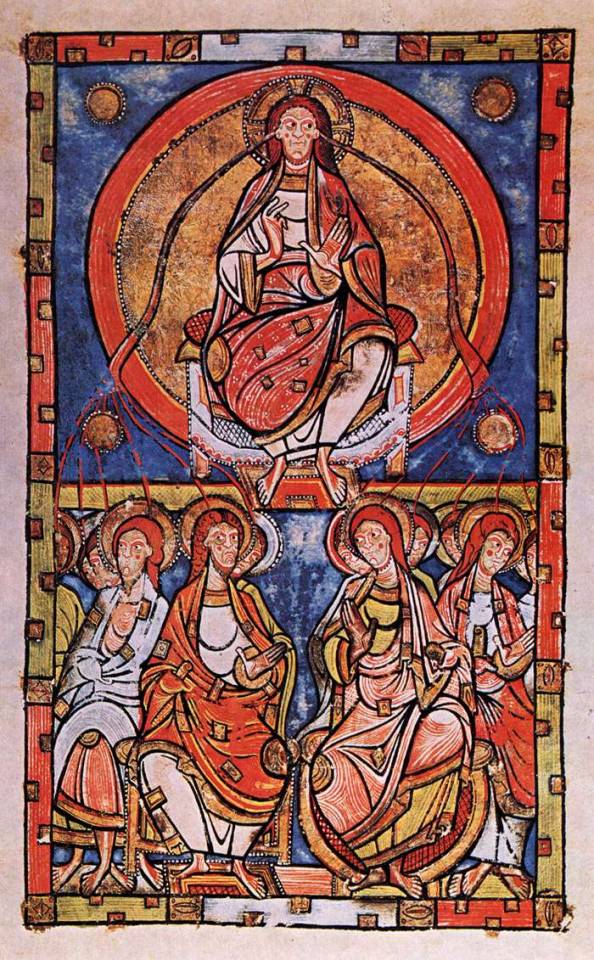
A stylized depiction of the Holy Spirit descending upon the Apostles at Pentecost. Miniature illumination on parchment from the Sacramentary of Saint-Étienne, executed by an unknown 12th-century artist in Limoges for the Saint-Étienne Cathedral in Toulouse. Now in the Bibliothèque Nationale, Paris.
#art#art history#Middle Ages#medieval#medieval art#religious art#Biblical art#Christian art#Christianity#Catholicism#Acts of the Apostles#Pentecost#miniature#illuminated manuscript#manuscript illumination#French art#12th century art#Bibliothèque Nationale
233 notes
·
View notes
Text

knife by maggie dunlap
13 notes
·
View notes
Text
Magic vs. Miracle (Acts 8:9-25)
Today, although few people practice an overt form of magic as the ancients once did, we still must be wary of those who promise magical results for whatever we need or what ails us.
Peter’s Conflict with Simon the Sorcerer, by Avanzino Nucci, 1620. Simon is on the right, wearing black. Now for some time a man named Simon had practiced sorcery in the city and amazed all the people of Samaria. He boasted that he was someone great, and all the people, both high and low, gave him their attention and exclaimed, “This man is rightly called the Great Power of God.” They followed…

View On WordPress
#acts#acts 8#acts of the apostles#apostle peter#apostle philip#christian discipleship#christian faith#christian life#christian ministry#christianity#church dynamics#control#faith#holy spirit#miracles#motives#new life#power#selfishness#simon magus#simony#sin#the heart
2 notes
·
View notes
Text

By Jean-Pierre Isbouts
1 December 2022
After Jesus' death in A.D. 33, his early followers began slowly spreading out from Jerusalem to find sanctuary in places such as Cyrus, Phoenicia, Damascus, and Antioch.
The authors of the New Testament, like St. Luke the Evangelist who is believed to have penned the book Acts of the Apostles around A.D. 80, tell the struggles believers and the early church faced in their nascent days.
In Acts, Luke tells the story of St. Stephen, the first Christian martyr to be gruesomely executed in A.D. 36.
Stephen's stoning, Luke says, prompted other followers to flee so as not to fall victim to similar persecutions.
So, what does the Bible say about how this vulnerable faith got jumpstarted, eventually evolving into the world’s most populous religion with some 2.3 billion followers today?
Mystical conversion
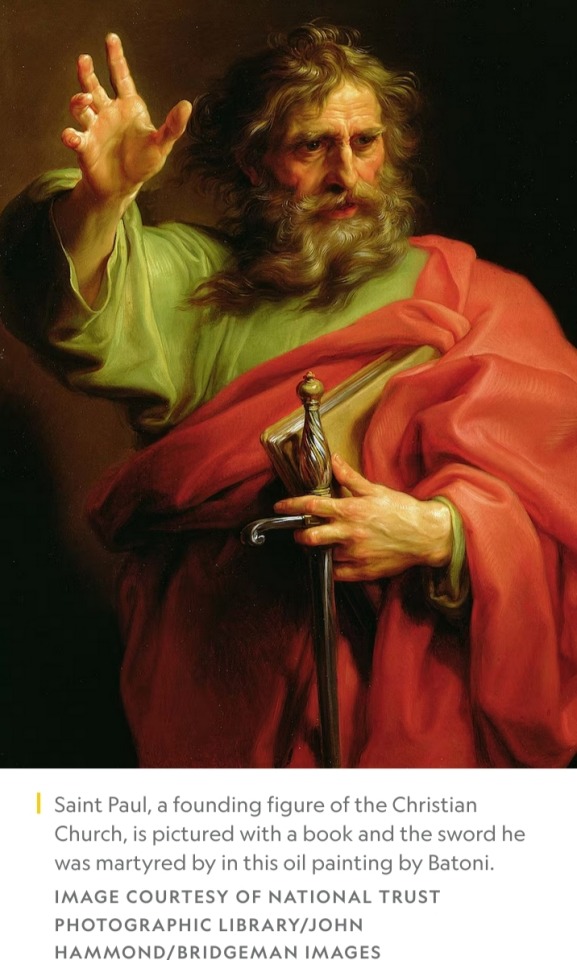
Acts of the Apostles tells the story of one man, Saul of Tarsus, who played a huge role in spreading early Christianity.
Devoutly Jewish and a Roman citizen, he was an unlikely proponent of this new faith.
It describes how he witnessed the mob scene around Stephen’s death and came to believe it was his solemn duty to persecute Christians, going so far as to drag Christian men and women to prison, punishing them to deny their faith.
He obtained permission from the high priest in Jerusalem to pursue and arrest fleeing Christians.
On his way to Damascus, Syria, however, a light from heaven flashed around him.
He fell to the ground and heard the voice of the resurrected Jesus saying, “Saul, why do you persecute me?” (Acts 9:4).
From that moment on, Saul (later called Paul) devoted himself to the Apostolic mission.
Spreading the message
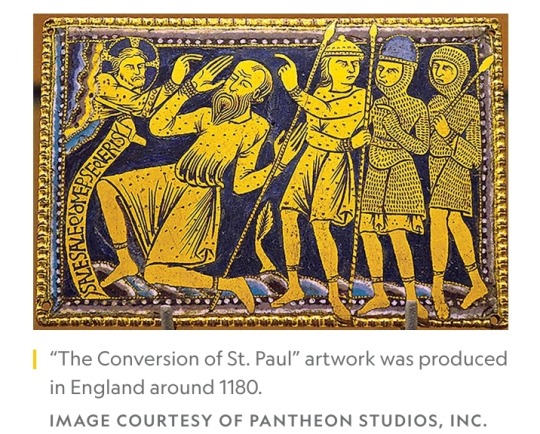
Among the places where early Christians fled for safety from persecution was Antioch, capital of Roman Syria.
The newly converted Paul found himself there and, with the apostle Barnabas, spent a year preaching the gospel and establishing the first Christian church.
It was there that the term “Christians” — "followers of Christ” — was coined (Acts 11:21).
It was also from Antioch that Paul embarked on three separate journeys, detailed in Acts, traveling over 10,000 miles between A.D. 46 and 57.
It tells of Paul’s visits to present-day Israel, Syria, Greece, and Turkey, walking roads that Romans built to facilitate control over the empire and enduring uncomfortable passages on weather-exposed decks of boats.
Along the way, he argued “persuasively about the kingdom of God” (Acts 19:8) and performed “extraordinary miracles” (Acts 19:11), such as curing the sick.
In Cyprus, he baptized a Roman consul, Paulus Sergius.
He shared Jesus’ gospel and established churches throughout the Roman Empire, communities of faith that featured confessions, liturgies, bishops, priests, and deacons.
Resistance, arrest, and martyrdom
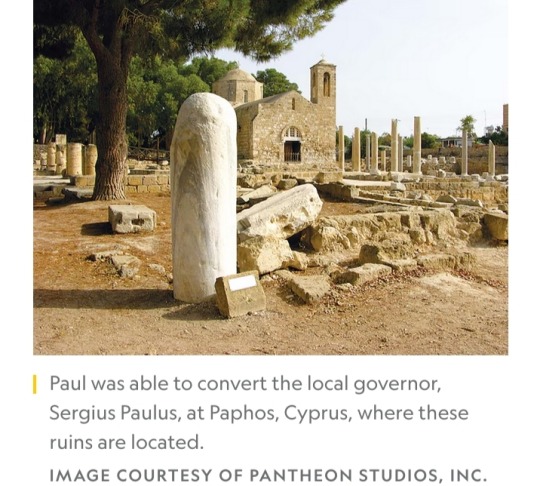
Everywhere he went, however, Paul also encountered Jewish followers, who called him a heretic.
He endured beatings, stoning, and arrests for preaching the gospel.
In Athens, Acts recounts how Paul became distressed over the preponderance of idols.
He tried to reason with the citizens:
“As I walked around and looked at your objects of worship, I even found an altar with this inscription: To an unknown god. So you are ignorant of the very thing you worship” (Acts 17:23).
He debated that this “unknown god” was the biblical God, the creator of heaven and earth.
Some sneered, but others said they wanted to hear more from Paul (Acts 17:32). Just by talking to people, he successfully made converts, one by one.
Acts records that Paul was arrested several times by the Romans and imprisoned twice in Rome.
The first time, between A.D. 60 and 62, he was arrested for causing a riot in a Jewish temple in Jerusalem.
He was allowed to live in a house, where it’s said he converted his Roman guards.
The Romans arrested him again sometime between A.D. 62 and 67.
This time, he was confined to Tullianum, a maximum security prison. Soon after, Paul is said to have been martyred.
His end is unclear, but the most common account claims he was beheaded at the order of the Roman emperor Nero, who blamed him as a Christian leader for Rome’s burning.
Paul’s unique ways
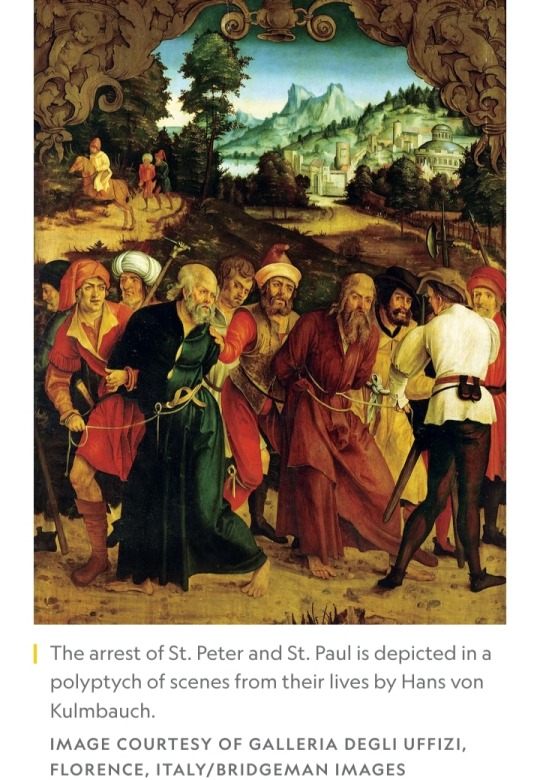
Many other apostles and missionaries evangelized Christianity at the same time as Paul.
While biblical accounts show that Paul didn't claim to be anything more than an ambassador for Christ, he did have a unique strategy.
He worked to baptize souls regardless of whether they were Jewish or Gentile.
One big question centered on whether converts to Christ should also be expected to become Jewish.
For the Jerusalem apostles, the answer was yes. For them, faith was inseparable from Jesus’ teachings as a Jewish rabbi. Paul disagreed.
He welcomed Gentiles who were attracted to Christianity but were not interested in adopting Jewish customs.
Paul was intelligent and controversial, pouring his experiences and thoughts into letters throughout his travels.
Some say he wrote so many letters because so many people argued with him.
Whatever the case, the letters summarize his views on Christianity, ideas that became the bedrock of the Catholic Church.

In his Letter to the Romans, for example, he said that faith in Christ supersedes Jewish Law; that each community is part of the “body of Christ” and should be governed by love; and that faith in the Christian God holds the promise of eternal life.
In all, he authored 13 epistles (seven of which are undisputedly his, six of which are disputed), making him the most prolific writer in the Bible.
Fourteen of the 27 books in the New Testament are attributed to him (though scholars also differ on this number).
Through it all, Paul articulated Jesus’ “kingdom of God” message into an idea that the largely Gentile population could understand and accept and his ability to spread the message of primitive Christianity is truly extraordinary.
His three journeys described in Acts permanently established the fledgling faith in Gentile lands and beyond.
Without him, the Greco-Roman world might never have heard about the teachings of a charismatic rabbi from Nazareth whose redemptive program went on to embrace the world.

#Saint Paul the Apostle#Christianity#Jesus#Jerusalem#Saint Luke the Evangelist#Acts of the Apostles#Saint Stephen#Saul of Tarsus#Christians#Antioch#Barnabas#Paulus Sergius#Roman Empire#Tullianum#Nero#Nazareth#faith#Holy Week 2024#Holy Week#Semana Santa#Good Friday#Catholic Church#conversion
3 notes
·
View notes
Text

THE DESCRIPTION OF THE CONVERSION OF ST. PAUL Feast Day: January 25
"Brother Saul, you have been chosen to see the Lord, and hear His voice. Now, you will be a witness unto all the world, that He lives." -Ananias, Animated Stories from the New Testament
The apostle to the Gentiles, was born Saul, in Tarsus, Cilicia, Roman Empire (modern-day Turkey) in circa 5 AD, of observant Jewish parents (Anitipater II and Cypros), and was a Roman citizen by birth.
In order to complete his studies, he went to Jerusalem to the school of Gamaliel the Elder, a leading authority in the Sanhedrin in the early first century AD and the son of Simeon ben Hillel and grandson of the great Jewish teacher Hillel the Elder, and was educated in the strict observance of the Pharisees.
His zeal for the Jewish law led him to support the stoning of St. Stephen, and to persecute the Church, believing it to be a heretic sect.
According to the Acts of the Apostles, as he is entrusted with a formal mission from the high priest, Saul departed for Damascus to arrest the Christians and to bring them to Jerusalem.
As he was nearing Damascus, about noon, a light from the sky suddenly flashed around him. He fell onto his horse and into the ground and heard a voice saying: 'Saul… Saul… Why do you persecuting me?'
He said: 'Who are you?'
The reply came: 'I am Jesus, whom you persecute. Arise, and go into the city, and you will be told what you must do.'
The men who were travelling with him stood speechless, for they heard the voice, but could see no one. When he got up, he was blind, and was brought to Damascus. For three days he was blind, and did not eat or drink anything.
There was a disciple named Ananias, and the Lord called to him in a vision. The Lord ordered Ananias to go to the house of Judas and ask for a man from Tarsus named Saul, for he is praying.
Then, Ananias answered: "Oh, Lord. I have heard many reports about this man and all the harm he has done to your holy people in Jerusalem. And he has come here with authority from the chief priests to arrest all who call on your name."
And the Lord replied to Ananias: "Go. This man is my chosen instrument to proclaim my name to the Gentiles and their kings and to the children of Israel. I will show him how much he must suffer for my name."
Three days later, Ananias entered the house, laid his hands on him, and said: 'Brother Saul, I have been sent by the Lord Jesus, so that you may recover your sight, and be filled with the Holy Spirit.'
Then, he was baptized.
2 notes
·
View notes